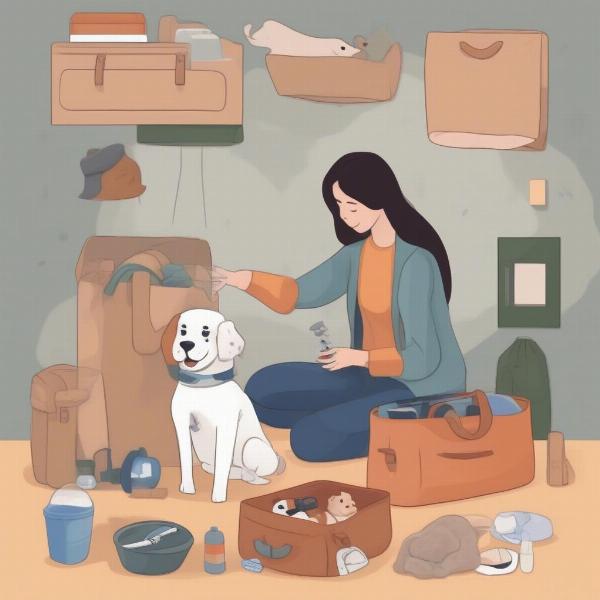Boarding your dog can be a stressful experience, especially if they are reactive. Finding a safe and comfortable environment that caters to their specific needs is crucial. This guide will provide valuable insights into choosing the right boarding facility for your reactive dog, ensuring their well-being and your peace of mind.
Understanding Your Reactive Dog’s Needs
Reactive dogs respond intensely to certain triggers, such as other dogs, people, or unfamiliar environments. This behavior often stems from fear, anxiety, or frustration. Knowing your dog’s specific triggers is the first step in finding suitable boarding. Consider their past experiences, what calms them, and what exacerbates their reactivity. This information will help you communicate effectively with potential boarding facilities.
What are the common signs of reactivity? These can include barking, lunging, growling, whining, and excessive panting. Recognizing these signs in your own dog will help you understand their triggers and communicate their needs to the boarding staff.
Choosing the Right Boarding Facility for Your Reactive Dog
Not all boarding facilities are created equal. For a reactive dog, a standard boarding environment can be overwhelming and potentially dangerous. Look for facilities that specialize in caring for dogs with behavioral challenges. These facilities often have smaller groups, individual play areas, and experienced staff trained in handling reactive dogs.
Ask about their experience with reactive dogs. A reputable facility will be open about their methods and willing to discuss your dog’s individual needs. Do they offer customized care plans? This is crucial for reactive dogs, as a one-size-fits-all approach won’t work.
Questions to Ask Potential Boarding Facilities
Before making a decision, ask potential boarding facilities specific questions about their protocols and procedures for reactive dogs. How do they manage interactions between dogs? What training methods do they use? What is their policy on medication? These questions will help you assess their suitability for your dog’s needs.
- Do you have experience with reactive dogs?
- What is your dog-to-staff ratio?
- Do you offer individual playtimes and walks?
- What type of training methods do you employ?
- Do you have a quiet area where my dog can retreat?
These questions will help you gauge the facility’s understanding of reactive dog behavior and their commitment to providing a safe and comfortable environment.
Preparing Your Reactive Dog for Boarding
Preparing your dog for boarding can significantly reduce their stress. Start by introducing them to the facility gradually. Short visits before their actual boarding stay can help them acclimate to the new environment and the staff. Pack familiar items, such as their favorite toys, bedding, and even a piece of your clothing. These familiar scents can offer comfort and reduce anxiety.
Maintaining their routine as much as possible is also beneficial. If your dog is on medication, ensure the boarding facility is aware and administer it as prescribed. Provide clear instructions regarding feeding schedules, exercise routines, and any specific needs your dog may have.
 Preparing a Reactive Dog for Boarding
Preparing a Reactive Dog for Boarding
Managing Expectations and Communication
Even with the best preparation, your reactive dog may still experience some stress during their boarding stay. Maintain open communication with the boarding facility throughout their stay. Ask for regular updates and be prepared to adjust their care plan if needed.
Remember, boarding is a temporary situation. With careful planning and open communication, you can ensure a safe and comfortable experience for your reactive dog.
What if My Dog Becomes More Reactive During Boarding?
Sometimes, despite all precautions, a dog’s reactivity can increase during boarding. This can be due to various factors, including the unfamiliar environment, the presence of other dogs, or changes in routine. Discuss a contingency plan with the boarding facility beforehand. This might involve early pick-up, additional training sessions, or adjustments to their environment.
Conclusion
Boarding a reactive dog requires careful planning and consideration. By understanding your dog’s needs, asking the right questions, and preparing them adequately, you can minimize their stress and ensure a positive boarding experience. Choosing a facility that specializes in caring for reactive dogs, and maintaining open communication with the staff, is crucial for their well-being and your peace of mind. Finding the right fit for your reactive dog can make all the difference in ensuring a safe and comfortable stay.
FAQ
- Is it safe to board a reactive dog? With proper planning and the right facility, yes.
- What should I look for in a boarding facility for my reactive dog? Look for facilities with experience handling reactive dogs, individualized care plans, and a focus on positive reinforcement training.
- How can I prepare my reactive dog for boarding? Gradual introductions to the facility, familiar items, and maintaining their routine can help ease the transition.
- What if my dog’s reactivity worsens during their stay? Discuss a contingency plan with the facility beforehand.
- How can I find boarding facilities that specialize in reactive dogs? Online searches, recommendations from your veterinarian or dog trainer, and local dog groups can be helpful resources.
- What should I pack for my reactive dog’s boarding stay? Familiar bedding, toys, food, medication, and a detailed care plan.
- How often should I communicate with the boarding facility during my dog’s stay? Regular updates are recommended, especially in the beginning.
ILM Dog is a leading international pet website dedicated to providing expert advice on dog care and well-being. From breed selection to health and training, nutrition to grooming, ILM Dog offers a wealth of resources for dog owners worldwide. We understand the unique challenges of caring for reactive dogs and are committed to helping you find the best boarding solutions. For further assistance or personalized advice, please contact us at [email protected] or call us at +44 20-3965-8624.